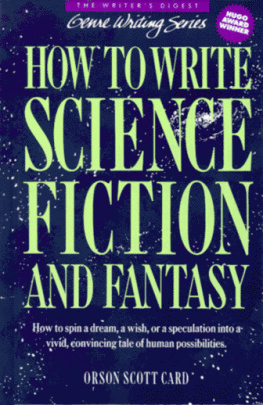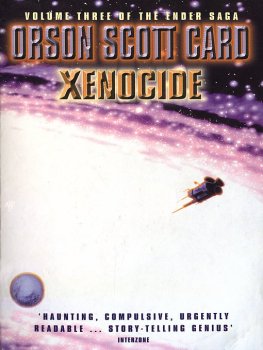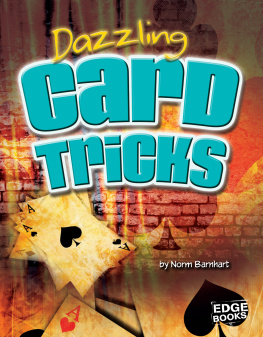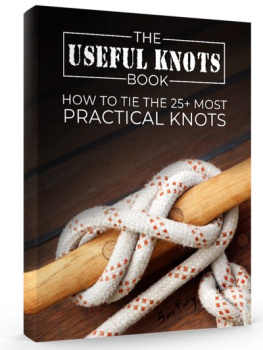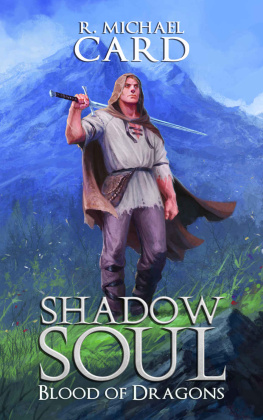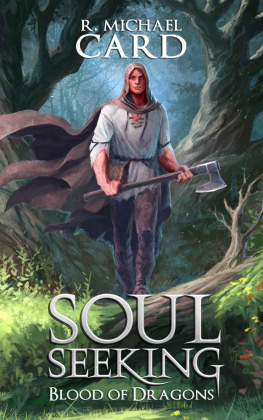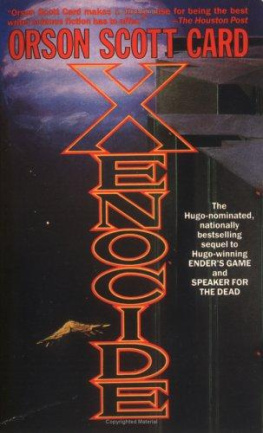Card - XENOCIDE
Here you can read online Card - XENOCIDE full text of the book (entire story) in english for free. Download pdf and epub, get meaning, cover and reviews about this ebook. genre: Humor. Description of the work, (preface) as well as reviews are available. Best literature library LitArk.com created for fans of good reading and offers a wide selection of genres:
Romance novel
Science fiction
Adventure
Detective
Science
History
Home and family
Prose
Art
Politics
Computer
Non-fiction
Religion
Business
Children
Humor
Choose a favorite category and find really read worthwhile books. Enjoy immersion in the world of imagination, feel the emotions of the characters or learn something new for yourself, make an fascinating discovery.

XENOCIDE: summary, description and annotation
We offer to read an annotation, description, summary or preface (depends on what the author of the book "XENOCIDE" wrote himself). If you haven't found the necessary information about the book — write in the comments, we will try to find it.
XENOCIDE — read online for free the complete book (whole text) full work
Below is the text of the book, divided by pages. System saving the place of the last page read, allows you to conveniently read the book "XENOCIDE" online for free, without having to search again every time where you left off. Put a bookmark, and you can go to the page where you finished reading at any time.
Font size:
Interval:
Bookmark:
XENOCIDE
by Orson Scott Card
(c) 1991 Orson Scott Card
v1.0 (24-Jul-1999)
If you find and correct errorsin the text, please update the version number by 0.1 and redistribute.
Chapter 1 -- A PARTING
Han Fei-tzu sat in lotusposition on the bare wooden floor beside his wife's sickbed. Until a moment agohe might have been sleeping; he wasn't sure. But now he was aware of the slightchange in her breathing, a change as subtle as the wind from a butterfly'spassing.
Jiang-qing, for her part, mustalso have detected some change in him, for she had not spoken before and nowshe did speak. Her voice was very soft. But Han Fei-tzu could hear her clearly,for the house was silent. He had asked his friends and servants for stillnessduring the dusk of Jiang-qing's life. Time enough for careless noise during thelong night that was to come, when there would be no hushed words from her lips.
"Still not dead,"she said. She had greeted him with these words each time she woke during thepast few days. At first the words had seemed whimsical or ironic to him, butnow he knew that she spoke with disappointment. She longed for death now, notbecause she hadn't loved life, but because death was now unavoidable, and whatcannot be shunned must be embraced. That was the Path. Jiang-qing had nevertaken a step away from the Path in her life.
"Then the gods are kindto me," said Han Fei-tzu.
"To you," shebreathed. "What do we contemplate?"
It was her way of asking himto share his private thoughts with her. When others asked his private thoughts,he felt spied upon. But Jiang-qing asked only so that she could also think thesame thought; it was part of their having become a single soul.
"We are contemplating thenature of desire," said Han Fei-tzu.
"Whose desire?" sheasked. "And for what?"
My desire for your bones toheal and become strong, so that they don't snap at the slightest pressure. Sothat you could stand again, or even raise an arm without your own musclestearing away chunks of bone or causing the bone to break under the tension. Sothat I wouldn't have to watch you wither away until now you weigh only eighteenkilograms. I never knew how perfectly happy we were until I learned that wecould not stay together.
"My desire," heanswered. "For you."
"'You only covet what youdo not have.' Who said that?"
"You did," said HanFei-tzu. "Some say, 'what you cannot have.' Others say, 'what you shouldnot have.' I say, 'You can truly covet only what you will always hungerfor.'"
"You have meforever."
"I will lose you tonight.Or tomorrow. Or next week."
"Let us contemplate thenature of desire," said Jiang-qing. As before, she was using philosophy topull him out of his brooding melancholy.
He resisted her, but onlyplayfully. "You are a harsh ruler," said Han Feitzu. "Like yourancestor-of-the-heart, you make no allowance for other people's frailty."Jiang-qing was named for a revolutionary leader of the ancient past, who hadtried to lead the people onto a new Path but was overthrown by weak-heartedcowards. It was not right, thought Han Fei-tzu, for his wife to die before him:her ancestor-of-the-heart had outlived her husband. Besides, wives should livelonger than husbands. Women were more complete inside themselves. They werealso better at living in their children. They were never as solitary as a manalone.
Jiang-qing refused to let himreturn to brooding. "When a man's wife is dead, what does he longfor?"
Rebelliously, Han Fei-tzu gaveher the most false answer to her question. "To lie with her," hesaid.
"The desire of thebody," said Jiang-qing.
Since she was determined tohave this conversation, Han Fei-tzu took up the catalogue for her. "Thedesire of the body is to act. It includes all touches, casual and intimate, andall customary movements. Thus he sees a movement out of the corner of his eye,and thinks he has seen his dead wife moving across the doorway, and he cannotbe content until he has walked to the door and seen that it was not his wife.Thus he wakes up from a dream in which he heard her voice, and finds himselfspeaking his answer aloud as if she could hear him."
"What else?" askedJiang-qing.
"I'm tired ofphilosophy," said Han Fei-tzu. "Maybe the Greeks found comfort in it,but not me."
"The desire of thespirit," said Jiang-qing, insisting.
"Because the spirit is ofthe earth, it is that part which makes new things out of old ones. The husbandlongs for all the unfinished things that he and his wife were making when shedied, and all the unstarted dreams of what they would have made if she hadlived. Thus a man grows angry at his children for being too much like him andnot enough like his dead wife. Thus a man hates the house they lived intogether, because either he does not change it, so that it is as dead as hiswife, or because he does change it, so that it is no longer half of hermaking."
"You don't have to be angryat our little Qing-jao," said Jiang-qing.
"Why?" asked HanFei-tzu. "Will you stay, then, and help me teach her to be a woman? All Ican teach her is to be what I am-- cold and hard, sharp and strong, likeobsidian. If she grows like that, while she looks so much like you, how can Ihelp but be angry?"
"Because you can teachher everything that I am, too," said Jiang-qing.
"If I had any part of youin me," said Han Fei-tzu, "I would not have needed to marry you tobecome a complete person." Now he teased her by using philosophy to turnthe conversation away from pain. "That is the desire of the soul. Becausethe soul is made of light and dwells in air, it is that part which conceivesand keeps ideas, especially the idea of the self. The husband longs for hiswhole self, which was made of the husband and wife together. Thus he neverbelieves any of his own thoughts, because there is always a question in hismind to which his wife's thoughts were the only possible answer. Thus the wholeworld seems dead to him because he cannot trust anything to keep its meaningbefore the onslaught of this unanswerable question."
"Very deep," saidJiang-qing.
"If I were Japanese Iwould commit seppuku, spilling my bowel into the jar of your ashes."
"Very wet andmessy," she said.
He smiled. "Then I shouldbe an ancient Hindu, and burn myself on your pyre."
But she was through withjoking. "Qing-jao," she whispered. She was reminding him he could donothing so flamboyant as to die with her. There was little Qing-jao to carefor.
So Han Fei-tzu answered herseriously. "How can I teach her to be what you are?"
"All that is good inme," said Jiang-qing, "comes from the Path. If you teach her to obeythe gods, honor the ancestors, love the people, and serve the rulers, I will bein her as much as you are."
"I would teach her thePath as part of myself," said Han Fei-tzu.
"Not so," saidJiang-qing. "The Path is not a natural part of you, my husband. Even withthe gods speaking to you every day, you insist on believing in a world whereeverything can be explained by natural causes."
"I obey the gods."He thought, bitterly, that he had no choice; that even to delay obedience wastorture.
"But you don't know them.You don't love their works."
"The Path is to love thepeople. The gods we only obey." How can I love gods who humiliate me andtorment me at every opportunity?
"We love the peoplebecause they are creatures of the gods."
"Don't preach tome."
She sighed.
Her sadness stung him like aspider. "I wish you would preach to me forever," said Han Fei-tzu.
"You married me becauseyou knew I loved the gods, and that love for them was completely missing fromyourself. That was how I completed you."
How could he argue with her,when he knew that even now he hated the gods for everything they had ever doneto him, everything they had ever made him do, everything they had stolen fromhim in his life.
Next pageFont size:
Interval:
Bookmark:
Similar books «XENOCIDE»
Look at similar books to XENOCIDE. We have selected literature similar in name and meaning in the hope of providing readers with more options to find new, interesting, not yet read works.
Discussion, reviews of the book XENOCIDE and just readers' own opinions. Leave your comments, write what you think about the work, its meaning or the main characters. Specify what exactly you liked and what you didn't like, and why you think so.

